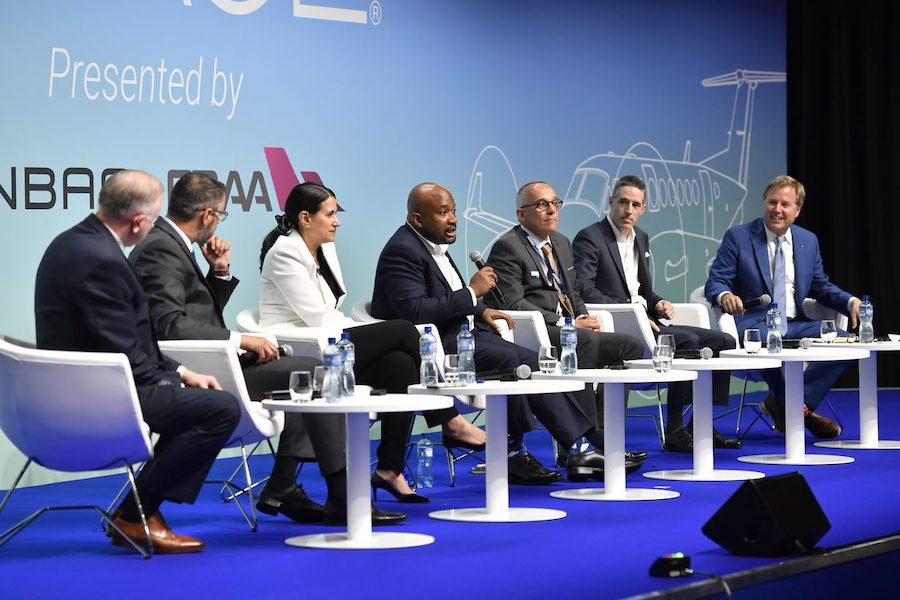
It may not be the perfect answer, but if bizav is to meet its carbon-reduction targets, increasing the use of sustainable aviation fuels (SAF) is essential. Messaging from industry, trade associations and pan-sector bodies such as the SAF Coalition has been consistent and clear, yet it appears the message is not always getting through.
Despite extensive awareness of SAF, and related adjustments—or lack of—for airframes and powerplants, FBOs and airports have told ShowNews in recent months that, often, captains remain reluctant to put SAF into their aircraft.
Corporations, flight departments and the end-user passengers may all be getting the message that SAF is a like-for-like replacement for Jet A and that it can be used without any issues, but for some reason the commanders of the aircraft do not seem to be receiving those signals as loudly and clearly. As a result, fewer FBOs and airports are investing in SAF infrastructure, as demand remains too low to justify the necessary investment. During a panel discussion at EBACE, representatives of aircraft and engine OEMs offered views on how this effort can be enhanced, and how take-up of SAF could be accelerated.
"I think it comes back to repetition, and the simplicity of message," says Melvyn Heard, president for GE Aviation's Honda Aero and Passport engine programs. "For us to all be on the same page—that SAF is Jet A—is one place where we have to start. The minute we have to start going into stoichiometric curves and start talking about equations on how combustion actually works, we lose people. The message needs to be very simple, very clear, and repeated over and over by the industry."
Mathieu Noel, director of product strategy, sustainability and design at Bombardier, echoes Heard's views. "Education is the art of repetition," he says. "There's not just one way to get to a different flight department—there's multiple different ways. The SAF Coalition aims to do that with simple guides. If you visit futureofsustainablefuel.com there's a ton of resources to reach out to different operators about that. And then it's also removing barriers; doing it ourselves, showing that it can work, that it doesn't void warranty. I do believe there will be a hockey-stick effect in terms of interest and in terms of pick rates over time."
"As OEMs, we have a very close link with our customers, and I think a good way of increasing the demand is by telling the customer, 'Ask your FBO about the fuel'," says Alvadi Serpa, director of product strategy and competitive intelligence at Embraer Executive Jets. "They will ask once, they will ask twice, and then, eventually, there will be fuel. We have to convince our customers that it's good, it is safe, and from there they will ask for it, and the demand will come. And we're going to start seeing it at FBOs."
"We have reached out to our customers on various venues at sustainability panels, and that's healthy," says Charles Etter, Gulfstream's staff scientist and technical fellow. "And we have different venues, like customer-advisory boards and things, and in almost every case we're reaching out to our customers and saying: 'It is not like Jet A: It is Jet A, and here's the reasons why.' They're all at different levels of their sustainability journey. Some of them still have those basic questions and concerns. Some are much further along and they get it, but we still need to work on that education piece."
Of course, SAF is only one part of the picture. Nicole Kappos, who is responsible for driving growth in Pratt & Whitney Canada's aftermarket business, pointed out that sustainable fuel is only one of the "technology pillars" the company uses to build its sustainability strategy on.
"What we're realizing is that you have to use all these different levers," she says. "One being SAF. One is making sure you have more efficient propulsion systems; another is offering services like carbon offset—something that is readily available. And then of course making sure that, back home, [reducing] your own footprint—you're a corporate citizen, a sustainable citizen."
But educating the bizav community about SAF remains front and center. And work has to continue to ensure that all relevant audiences are addressed. Drilling down further into the organizational chain, and ensuring the message is directly communicated at all levels, is vital. Education also needs to start as early as possible in an individual's career, one speaker argues.
"I believe it's very important to speak to all the parties," says Thierry Lamant, Dassault Aviation's directorate program co-ordinator and SAF focal point. "We should discuss not only with the owner of the aircraft, with the operators, with the pilots, the technicians, but also we should start to disseminate the information at the level of the training centers and the education of pilots. From primary school, I would say.”
And it will be the next generation who hold the key when it comes to determining the pace at which the industry moves forward. Heard describes how his behaviors have been changed under pressure from his children: "I purposely had to remove the bottles of water from my table [on the conference podium], because my youngest daughter eco-shames me for drinking bottled water," he says. The views of today's youngest people are ones the entire aviation industry needs to be considering seriously and taking note of if it is to preserve its own future, he says.
"The next generation's going to have a choice where they work," he notes. "So for us, this sustainability message is not only because we're doing great things for our customers and our products: but to recruit people to the aviation industry. Getting the right message out and keeping it simple [is] part of our message as well, so we can have a sustainable workforce coming in."





